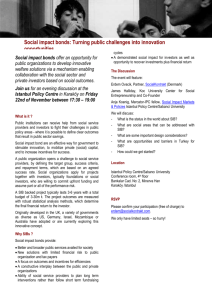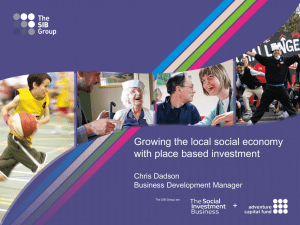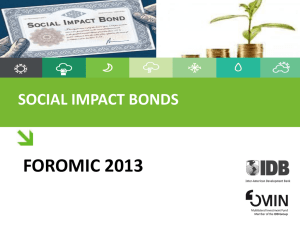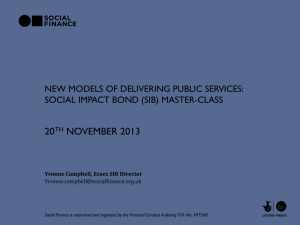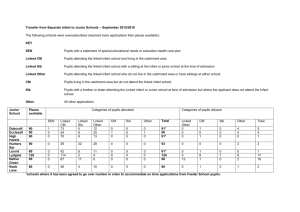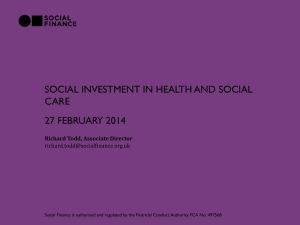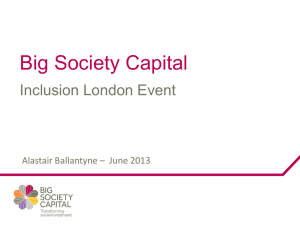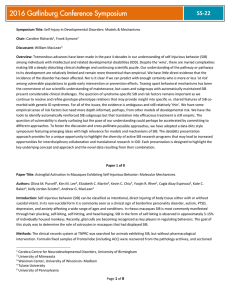feasibility_study_sow_revised_91913ua_js_2
advertisement
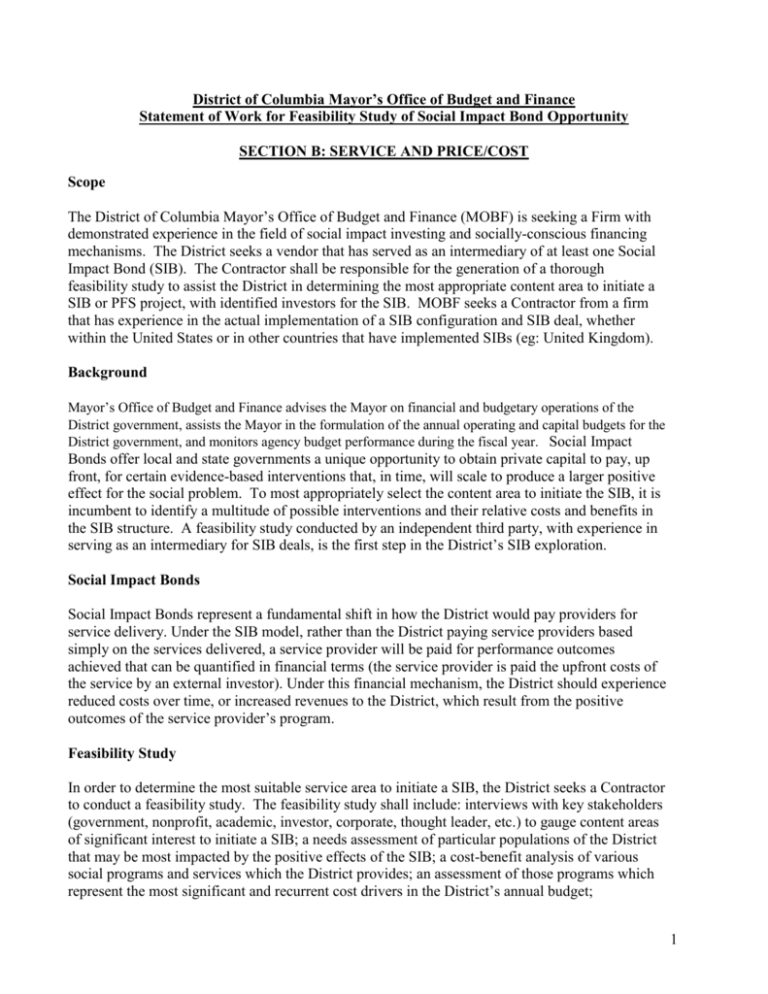
District of Columbia Mayor’s Office of Budget and Finance Statement of Work for Feasibility Study of Social Impact Bond Opportunity SECTION B: SERVICE AND PRICE/COST Scope The District of Columbia Mayor’s Office of Budget and Finance (MOBF) is seeking a Firm with demonstrated experience in the field of social impact investing and socially-conscious financing mechanisms. The District seeks a vendor that has served as an intermediary of at least one Social Impact Bond (SIB). The Contractor shall be responsible for the generation of a thorough feasibility study to assist the District in determining the most appropriate content area to initiate a SIB or PFS project, with identified investors for the SIB. MOBF seeks a Contractor from a firm that has experience in the actual implementation of a SIB configuration and SIB deal, whether within the United States or in other countries that have implemented SIBs (eg: United Kingdom). Background Mayor’s Office of Budget and Finance advises the Mayor on financial and budgetary operations of the District government, assists the Mayor in the formulation of the annual operating and capital budgets for the District government, and monitors agency budget performance during the fiscal year. Social Impact Bonds offer local and state governments a unique opportunity to obtain private capital to pay, up front, for certain evidence-based interventions that, in time, will scale to produce a larger positive effect for the social problem. To most appropriately select the content area to initiate the SIB, it is incumbent to identify a multitude of possible interventions and their relative costs and benefits in the SIB structure. A feasibility study conducted by an independent third party, with experience in serving as an intermediary for SIB deals, is the first step in the District’s SIB exploration. Social Impact Bonds Social Impact Bonds represent a fundamental shift in how the District would pay providers for service delivery. Under the SIB model, rather than the District paying service providers based simply on the services delivered, a service provider will be paid for performance outcomes achieved that can be quantified in financial terms (the service provider is paid the upfront costs of the service by an external investor). Under this financial mechanism, the District should experience reduced costs over time, or increased revenues to the District, which result from the positive outcomes of the service provider’s program. Feasibility Study In order to determine the most suitable service area to initiate a SIB, the District seeks a Contractor to conduct a feasibility study. The feasibility study shall include: interviews with key stakeholders (government, nonprofit, academic, investor, corporate, thought leader, etc.) to gauge content areas of significant interest to initiate a SIB; a needs assessment of particular populations of the District that may be most impacted by the positive effects of the SIB; a cost-benefit analysis of various social programs and services which the District provides; an assessment of those programs which represent the most significant and recurrent cost drivers in the District’s annual budget; 1 recommendations regarding necessary additions, changes or augmentations to existing program financing mechanisms to implement a SIB; final recommendation of 2-4 distinct content areas including investors and funders, to provide the initial capital investment in the SIB. Given the success of the Feasibility Study, the vendor may be retained as the primary financial intermediary in the implementation of the SIB. Definitions MOBF – Mayor’s Office of Budget and Finance SIB – Social Impact Bond Stakeholder – Member of a government office or agency, private foundation, company or investment firm, nonprofit organization leader, with a stake in the success of the SIB Cost-Benefit Analysis – A financial analysis using risk factoring to determine expected outcomes of particular interventions. Cost Driver Analysis – A financial analysis using financial modeling to determine the scale and effect that certain social programs have on the District’s overall budget. Needs Assessment – An analysis of communities and demographics within the District to determine areas of greatest social need (eg: health care, education, homelessness intervention) Requirements The selected firm must complete the Feasibility Study no later than February 14, 2013. Should the District assess that the Firm of the Feasibility Study is the most appropriate vendor to serve as the intermediary of the Social Impact Bond, the following activities shall be undertaken by the vendor in the first stages of the SIB: The District may determine to retain the Firm of the feasibility study as the primary intermediary for the SIB or PFS program. In this event, the Firm must be able to demonstrate the ability to work closely with MOBF, other District agencies, service providers, providers of working capital, and the many interested parties in the community who are seeking ways to improve the delivery of SIB or PFS services. To accomplish this objective, MOBF may determine that the Firm, in consultation with District agency partners and the District’s evaluation partner, must have the capacity and experience in the following: 1. 2. 3. 4. 5. 6. 7. 8. 9. 10. Design and develop the Pay for Success or SIB program model Determine likely or possible investor or financing partners Monitor and track service providers’ outcomes Arrange sources of working capital for service providers Develop service provider RFP, contracts and schedule of payments Manage provider performance, contracts, and payments Participate in evaluation activities with the State’s evaluation partner Design and develop the return on investment goal, methodology and calculation Coordinate data collection Administer other aspects of the pilot program 2 The Firm shall establish an ongoing relationship with District agency partners in all areas of program development to provide continuing analysis, consultation and advice. District agency partners, and the oversight committee as appropriate, must approve program design, contracts, return on investment criteria, provider payments, the sources of working capital, the evaluation design, and other key areas of program management. The Firm shall have: Actual experience serving as a financial or knowledge intermediary of a Social Impact Bond; Established partnerships with private and corporate partners interested in the SIB, Pay for Success, or Impact Investing fields; Preference will be given to vendors that have expert knowledge and experience working across all sectors (including government, nonprofit, service provider, investment/funder) in addition to expertise as a financial intermediary. Specifically the Contractor shall do the following: Phase 1 – Qualitative Data Gathering Interview key stakeholders (government, nonprofit, academic, investor, corporate, etc) to gauge content areas of significant interest to initiate a SIB; Conduct a needs assessment of particular populations of the District that may be most impacted by the positive effects of the SIB; Phase 2 – Quantitative and Budget Analysis Conduct a cost-benefit analysis of various social programs and services which the District provides; Provide an assessment of those programs which represent the most significant and recurrent cost drivers in the District’s annual budget; Phase 3 – Recommendations Present to MOBF and EOM in person all following recommendations: Provide recommendations regarding necessary additions, changes or augmentations to existing program financing mechanisms to implement a SIB; Provide final recommendation of 2-4 distinct content areas to serve for the SIB (possible areas could include education, human services, public safety, public health, etc). o Included within these recommendations should be specific proposals for likely investors or funders of the SIB, based on giving history and current interest in Impact Investing. Deliverables The deliverables shall include but not limited to: Contractor shall provide written updates to Contract Administrator bi-weekly via email. Report of stakeholder interviews in pdf of PowerPoint deck presentation, twenty (20) soft copies format, and presentation Report of needs assessment in pdf and twenty (20) soft copies, and presentation 3 Physical copy of CBA and CDA, either in Excel or other quantitative analysis tool and twenty (20) soft copies Recommendations of both 1) SIB prospective content areas, and 2) prospective funders, presented in person and via briefing book including twenty (20) soft copies 4
